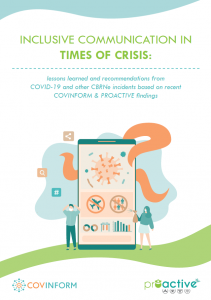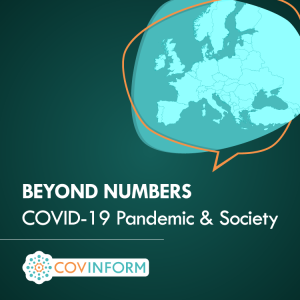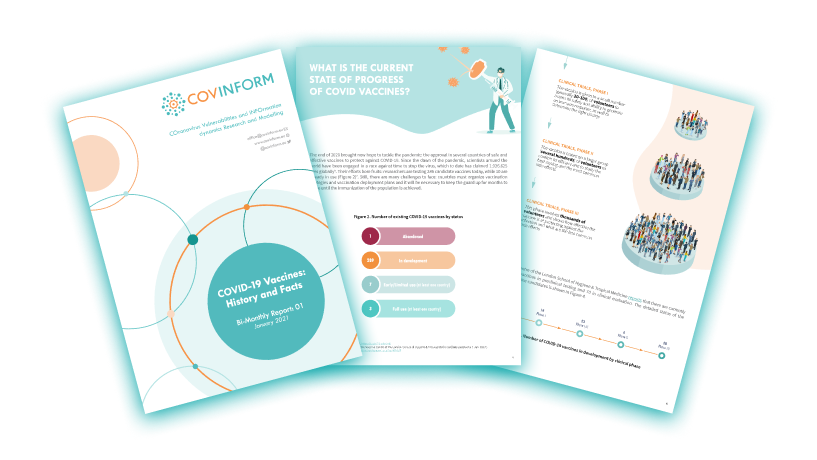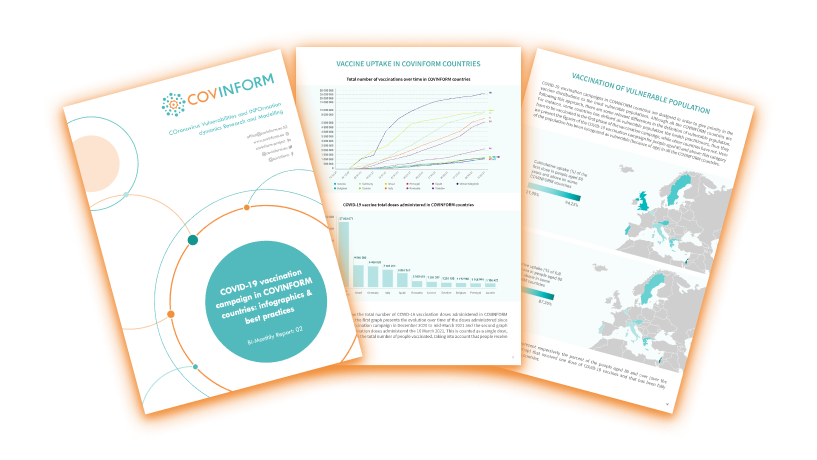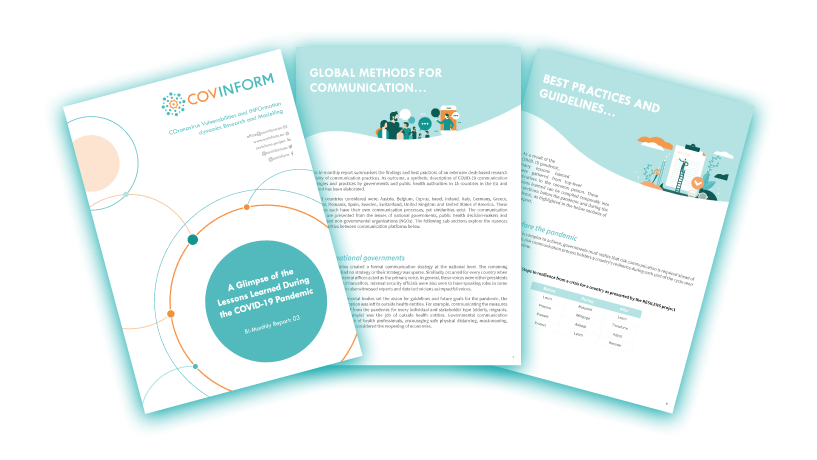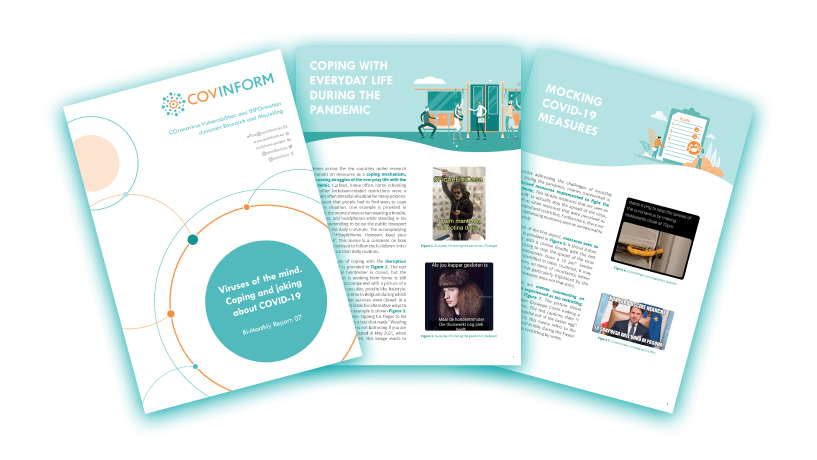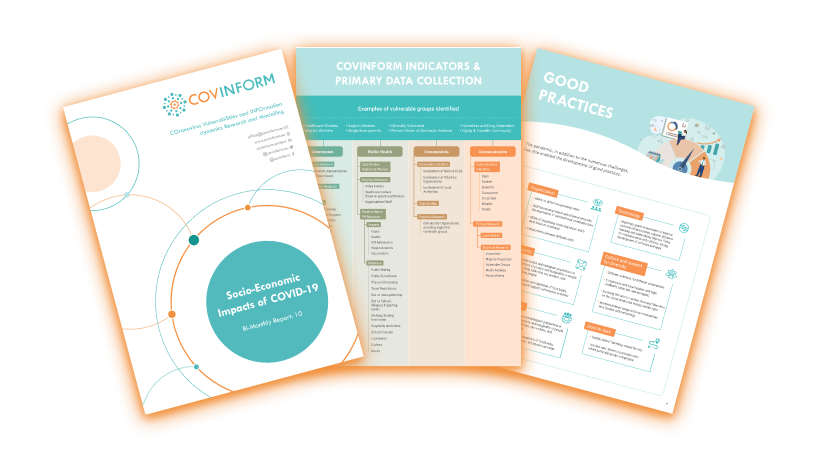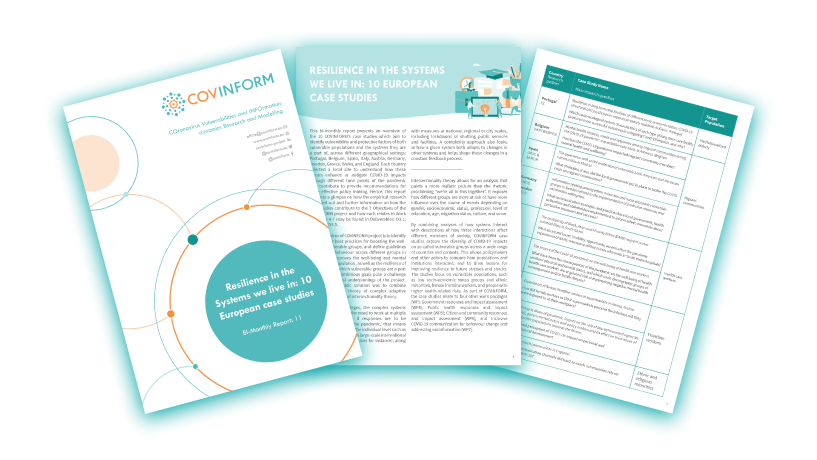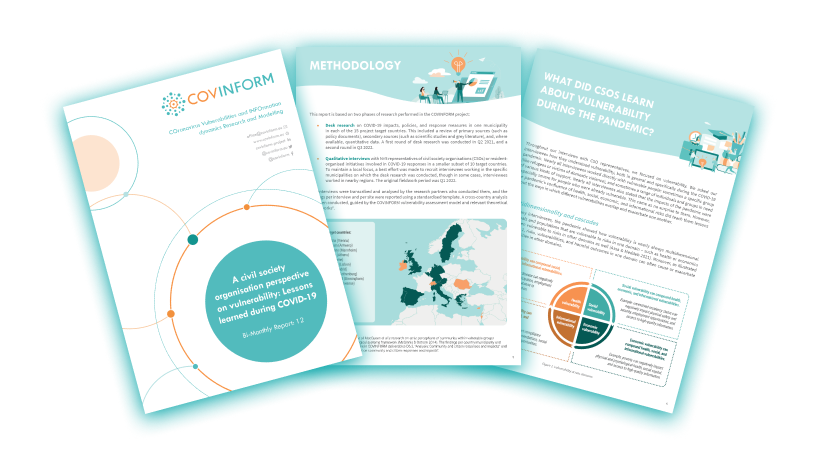COVINFORM Outputs
Disclaimer: Our outputs cannot and do not contain health advice. The information provided by the COVINFORM project is for general information and education purposes only, and is not a substitute for professional health advice.
Accordingly, before taking any action based upon such information, we encourage you to consult with the appropriate medical and healthcare professionals.
Anson, S., Bertel, D., Havârneanu G., & Petersen, L. (2021). Inclusive communication in times of crisis: lessons learned and recommendations from COVID-19 and other CBRNe incidents based on recent COVINFORM & PROACTIVE findings. Whitepaper. – Click here to download the PDF
Podcast Beyond Numbers: COVID-19 and Society
E02 – 2: Communication & Public Health Campaigns – Click here to go to the episode
E03 – 3: Data, Interpretation & Misinformation – Click here to go to the episode
Bi-monthly report 01 – COVID-19 Vaccines: History and Facts – Click here to download the PDF
Bi-monthly report 02 – COVID-19 vaccination campaign in COVINFORM countries: infographics & best practices – Click here to download the PDF
Bi-monthly report 03 – A Glimpse of the Lessons Learned During the COVID-19 Pandemic – Click here to download the PDF
Bi-monthly report 07 – Virusesm of the mind. Coping and joking about COVID-19 – Click here to download the PDF
After two years of pandemic | COVINFORM Bi-monthly report #8, March 2022
Interview with Chaim Rafalowski, Disaster Management and EU Projects Coordinator, Magen David Adom in Israel, conducted by Elena Ambrosetti & Marina Zannella, Sapienza University of Rome.
After two years of pandemic | COVINFORM Bi-monthly report #9, May 2022
Bi-monthly report 10 – Socio-Economic Impacts of COVID-19 – Click here to download the PDF
Bi-Monthly Report: 11 – Resilience in the Systems we live in: 10 European case studies – Click here to download the PDF
Bi-Monthly Report: 12 – A civil society organisation perspective on vulnerability: Lessons learned during COVID-19 – Click here to download the PDF
Bi-Monthly Report: 13 – ‘Closer to death’: thinking about dying in pandemic times – Click here to download the PDF
Scientific Literature
Anstead, N. (2022). The politics of communicating COVID in the United Kingdom. Journal of Media Ethics, 37(2), 151-153.
Barua, Z., Barua, S., Aktar, S., Kabir, N., & Li, M. (2020). Effects of misinformation on COVID-19 individual responses and recommendations for resilience of disastrous consequences of misinformation. Progress in Disaster Science, 8, 100119.
Boberg, S., Quandt, T., Schatto-Eckrodt, T., & Frischlich, L. (2020). Pandemic populism: Facebook pages of alternative news media and the corona crisis–A computational content analysis.
Brennen, J.S., Simon F.M., Howard P.N. & Rasmus K.N. (2020) Types, Sources, and Claims of COVID-19 Misinformation.
Clark‐Ginsberg, A., & Petrun Sayers, E. L. (2020). Communication missteps during COVID‐19 hurt those already most at risk. Journal of Contingencies and Crisis Management, 28(4), 482-484.
Egelhofer, J.L., L. Aaldering, J.-M., Eberl, S., Galyga, & Lecheler, S. (2020). From Novelty to Normalization? How Journalists Use the Term ‘Fake News’ in Their Reporting. Journalism Studies 21: 1323–1343. https://doi.org/10.1080/1461670x.2020.1745667.
Freeman, D., Waite, F., Rosebrock, L., Petit, A., Causier, C., East, A., … & Lambe, S. (2020). Coronavirus conspiracy beliefs, mistrust, and compliance with government guidelines in England. Psychological Medicine, 1-13. https://doi.org/10.1017/S0033291720001890
Hauer, M. K., & Sood, S. (2020). Using social media to communicate sustainable preventive measures and curtail misinformation. Frontiers in psychology, 11, 568324.
Humprecht, E., F. Esser, and P. Van Aelst. 2020. Resilience to Online Disinformation: A Framework for Cross-National Comparative Research. The International Journal of Press/Politics 25(3): 493–516.
Jolley, D., & Paterson, J. L. (2020). Pylons ablaze: Examining the role of 5G COVID-19 conspiracy beliefs and support for violence. British Journal of Social Psychology, 59, 628-640. https://doi.org/10.1111/bjso.12394
Kim, S. C., Vraga, E. K., & Cook, J. (2020). An Eye Tracking Approach to Understanding Misinformation and Correction Strategies on Social Media: The Mediating Role of Attention and Credibility to Reduce HPV Vaccine Misperceptions. Health Communication, 1–10. https://doi.org/10.1080/10410236.2020.1787933
Krause, N. M., Freiling, I., Beets, B., & Brossard, D. (2020). Fact-checking as risk communication: the multi-layered risk of misinformation in times of COVID-19. Journal of Risk Research, 23(7-8), 1052-1059.
Loomba, S., de Figueiredo, A., Piatek, S. J., de Graaf, K., & Larson, H. J. (2021). Measuring the impact of COVID-19 vaccine misinformation on vaccination intent in the UK and USA. Nature human behaviour, 5(3), 337-348.
Malecki, K. M., Keating, J. A., & Safdar, N. (2021). Crisis communication and public perception of COVID-19 risk in the era of social media. Clinical Infectious Diseases, 72(4), 697-702.
Malik, A., Khan, M. L., & Quan-Haase, A. (2021). Public health agencies outreach through Instagram during the COVID-19 pandemic: Crisis and Emergency Risk Communication perspective. International Journal of Disaster Risk Reduction, 61, 102346.
Maldonado, B. M. N., Collins, J., Blundell, H. J., & Singh, L. (2020). Engaging the vulnerable: a rapid review of public health communication aimed at migrants during the COVID-19 pandemic in Europe. Journal of migration and health, 1, 100004.
Motta, M., Sylvester, S., Callaghan, T., & Lunz-Trujillo, K. (2021). Encouraging COVID-19 vaccine uptake through effective health communication. Frontiers in Political Science, 3.
Rzymski, P., Borkowski, L., Drąg, M., Flisiak, R., Jemielity, J., Krajewski, J., … & Fal, A. (2021). The strategies to support the COVID-19 vaccination with evidence-based communication and tackling misinformation. Vaccines, 9(2), 109.
Sarla, G. S. (2020). COVID 19: myths and facts. Research & Review: Management of Emergency and Trauma Nursing, 2(2), 5-8. Link
Torpan, S., Hansson, S., Rhinard, M., Kazemekaityte, A., Jukarainen, P., Meyer, S. F., … & Orru, K. (2021). Handling false information in emergency management: A cross-national comparative study of European practices. International Journal of Disaster Risk Reduction, 57, 102151. https://doi.org/10.1016/j.ijdrr.2021.102151
Vraga, E. K., & Jacobsen, K. H. (2020). Strategies for effective health communication during the coronavirus pandemic and future emerging infectious disease events. World Medical & Health Policy, 12, 233–241. https://doi.org/10.1002/wmh3.359
Other literature
Guidelines on risk communication principles implementation – Deliverable 5.2 of the STAMINA project
Literature and other reading material
Other reading material
European Commission. Tackling coronavirus disinformation.
European Council. Infographic – COVID-19: EU coordination for safe and effective vaccination.
European Medicines Agency. Covid-19 vaccines Key facts.
Homeland Security News Wire (2021). Racist, Extremist, Anti-Semitic Conspiracies Surround Coronavirus Vaccine Rollout.
International Press Institute- Media Freedom in Europe in the shadow of COVID-19.
INTERPOL – Terrorist groups using COVID-19 to reinforce power and influence.
Johns Hopkins Coronavirus Resource Centre.
Lewandowsky, S. et al. (2021). The COVID-19 Vaccine Communication Handbook.
Unesco – Disinfodemic: Deciphering COVID-19 disinformation.
Unesco Journalism. ‘Fake News’ and Disinformation: A Handbook for Journalism Education and Training.
Wansink, B., & Timmer, J. (2020). COVID-19 Narratives that Polarise. Radicalisation Awareness Network.
World Data Forum (2020). Who is being left behind in COVID-19 data?
Initiatives
The UK COVID-19 news and information project
Civil Society Forum – Mythbusters: Debunking the most common EU myths in EaP countries through gaming.
COVID-19 Infodemie in Europa: Eine visuelle Analyse der Desinformation.
Cross-publisher COVID-19 rapid review initiative.
European Commission. Fighting disinformation.
European Commission. How to respond to 6 Coronavirus myths you’ve definitely read online.
European Commission. Identifying conspiracy theories.
European Parliament. Coronavirus: a timeline of EU action.
First Draft – Covering coronavirus: An online course for journalists.
Harvard Kennedy School. Misinformation Review.
International Press Institute. Tracker on Press Freedom Violations Linked to COVID-19 Coverage.
John Hopkins Medicine. Coronavirus Disease 2019: Myth vs. Fact.
New York Times. Coronavirus Vaccine Tracker.
Projects
EUNOMIA – User-oriented, secure, trustful & decentralised social media. H2020 Grant Agreement No. 825171.
CO-INFORM – Context Matters, Your Sources Too. H2020 Grant Agreement No 770302.
PROVENANCE – Intermediary-free solution for digital content verification. H2020 Grant Agreement No 825227.
HERoS – Health Emergency Response in Interconnected Systems. H2020 Grant Agreement No 101003606.
SocialTruth – Open Distributed Digital Content Verification for Hyper-connected Sociality. H2020 Grant Agreement No 825477.
WeVerify – Wider and enhanced verification for you. H2020 Grant Agreement No 825297.
Events
EPI-WIN webinar: What’s in a meme
Communication and Information Webinars on COVID-19
Impact of an infodemic in the times of COVID-19: online event
Digital Tech To Help Fight COVID-19 Misinformation
LGA virtual event: COVID-19 vaccine communications: tackling hesitancy and misinformation
Fake News and Democracy. Empowering People When Confronted with Misinformation
CHI’21, May 8-13 (virtual). W10: Opinions, Intentions, Freedom of Expression, …, and Other Human Aspects of Misinformation Online, 7 May JST 2200 – 8 May JST 0200 / 7 May EDT 0900-1300 / 7 May CEST 1500-1900, Organizers: Lara Schibelsky Codoy Piccolo, The Open University UK; Diotima Bertel, SYNYO GmbH; Tracie Farrell, The Open University UK; Pinelopi Troullinou, Trilateral Research. See here and here
VAXVOX Science Talks. Myths and facts about vaccination (13 November 2020). Rewatch the event here

